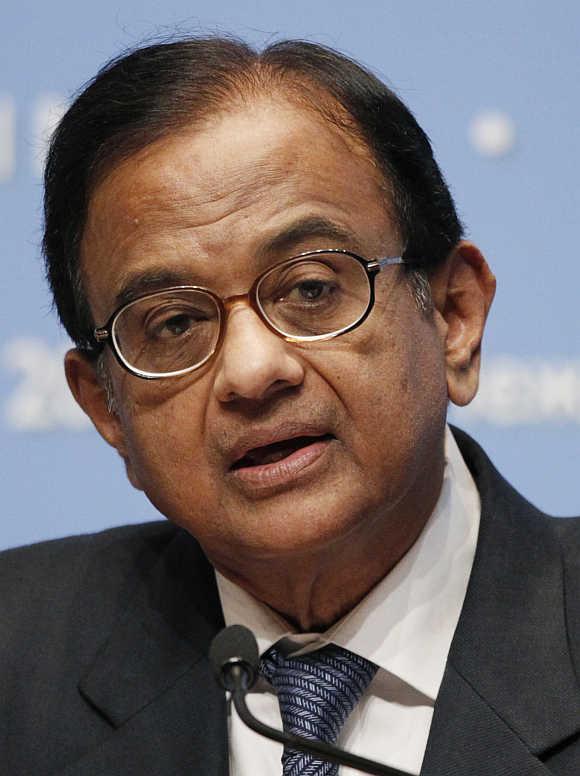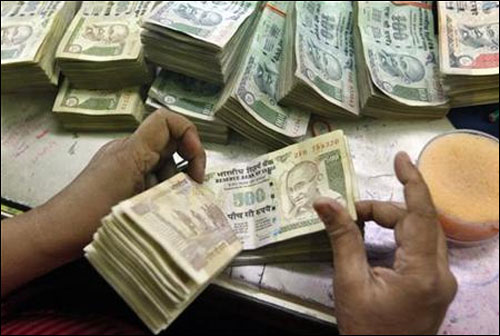 | « Back to article | Print this article |
Budget 2013: Just words, no action
The finance minister should have left the subject of the environment alone, because his understanding of what we need is outdated and myopic, writes Sunita Narain.
The mool mantra of Budget 2013 is inclusive and sustainable development, says Finance Minister P Chidambaram.
But, as far as the environment is concerned, there is no substance in the Budget that tells us how the direction of growth will be environmentally sound.
Instead, the finance minister talks about the Cabinet Committee on Investment, which has been set up to fast-track clearances.
There is no indication in his speech that this drive for investment will be cognisant of the needs for sustainability and will strengthen, not weaken, the regulatory system that governs green clearances.
Click NEXT to read further. . .
Speak to experts on Live Chat!
Union Budget, as it unfolded on February 28
Complete coverage: Union Budget 2013-14
Budget Impact Live!
Budget 2013: Just words, no action
In the environment section, the finance minister says he will evolve a scheme to encourage cities to take up waste-to-energy projects in public-private-partnership mode.
This shows his complete lack of understanding of the garbage drowning our cities.
The fact is that waste-to-energy plants require good segregation, high calorific value of waste and careful monitoring to ensure that there are no emissions of dioxins and other toxins because of burning plastics.
Not a single plant has worked in India. Instead, what we need is waste management strategies that encourage segregation, recycling and reuse.
Click NEXT to read further. . .
Speak to experts on Live Chat!
Union Budget, as it unfolded on February 28
Complete coverage: Union Budget 2013-14
Budget Impact Live!
Budget 2013: Just words, no action
These approaches are beginning to work, and what was needed was to incentivise municipalities, not to build white-elephant waste plants.
But, clearly, that does not suit the technology-fixated mindset.
Now these funds will push another round of bad projects, which will create more problems than they solve.
In my view, the finance minister should have left the subject of the environment alone, because his understanding of what we need is outdated and myopic.
This overdependence on technological fixes shows up once again when the Budget allocates Rs 1,400 crore (Rs 14 billion) to water-purification plants to deal with fluoride and arsenic.
Click NEXT to read further. . .
Speak to experts on Live Chat!
Union Budget, as it unfolded on February 28
Complete coverage: Union Budget 2013-14
Budget Impact Live!
Budget 2013: Just words, no action
There is enough experience to know that these plants do not work in rural India, where there are problems of maintenance and electricity, let alone its capacity to pay for treated water.
Instead, what has worked are programmes for rebuilding and cleaning surface systems, so that dependence on polluted groundwater goes down.
The finance minister is looking for brownie points on these crucial issues, but the problem is that he is getting the solutions all wrong.
If Budget 2013 was to pay any heed to its mool mantra, then it could have provided incentives for green growth in the states.
At the moment, the country has a provision to pay the "net present value" of forests while felling trees.
Click NEXT to read further. . .
Speak to experts on Live Chat!
Union Budget, as it unfolded on February 28
Complete coverage: Union Budget 2013-14
Budget Impact Live!
Budget 2013: Just words, no action
In other words, we pay to cut.
But there is no payment for standing forests, a legitimate and long-standing state demand. These are regions with high ecological value, or important water sources, or are vital for species protection.
These lands have to be managed only for conservation.
But to protect these forests, we need to incorporate the principles of valuing forests for the tangible as well as intangible benefits these lands provide.
These costs must be paid to the communities that live in and around forest lands; they must be compensated for not using resources. In 2004, the 12th Finance Commission agreed that the states must be paid for the maintenance of forests -- some Rs 1,000 crore (Rs 10 billion) between 2005 and 2010.
Click NEXT to read further. . .
Speak to experts on Live Chat!
Union Budget, as it unfolded on February 28
Complete coverage: Union Budget 2013-14
Budget Impact Live!
Budget 2013: Just words, no action
The amount was not substantial, but the principle was established.
In 2010, the 13th Finance Commission reiterated the need to compensate the states, and it enhanced the allocation to Rs 5,000 crore (Rs 50 billion) over the next five years.
But the money has still not been provided.
Budget 2013 is a missed opportunity.
But there are some good sides.
First, the Budget says it will support 10,000 new buses, especially for hill states.
This is an important initiative.
But the fact is that the government gives with one hand and grabs much more with another.
The current policy is to increase diesel prices for the bulk sector by Rs 10 per litre.
This has virtually killed all public bus companies. Ironically, the price increase for retail -- private cars -- is only Rs 0.50.
Click NEXT to read further. . .
Speak to experts on Live Chat!
Union Budget, as it unfolded on February 28
Complete coverage: Union Budget 2013-14
Budget Impact Live!
Budget 2013: Just words, no action
Which is why the increased sport utility vehicle excise duty from 27 to 30 per cent is a much-needed step, but falls short on what it will achieve.
The finance minister has rightly noted that SUVs occupy greater road and parking space, and thus bear a higher tax.
But they are also inefficient users of diesel, which remains cheaper than petrol.
Higher excise duty is too small a step to deal with the dieselisation of India given the diesel price increase for private cars is so marginal.
So, as far as I am concerned, this is not a policy initiative against SUVs -- only small talk and indifferent steps.
Click NEXT to read further. . .
Speak to experts on Live Chat!
Union Budget, as it unfolded on February 28
Complete coverage: Union Budget 2013-14
Budget Impact Live!
Budget 2013: Just words, no action
Second, there are indications that the renewable energy sector has been given the right direction.
It was being feared that the finance minister would succumb to pressure from wind energy producers, particularly active in his home state of Tamil Nadu, to reverse the policy to provide generation-based incentives.
This has not happened and is good news.
The earlier policy of capital-based incentives lead to projects that installed windmills, but did not often generate power.
My colleagues at the Centre for Science and Environment had also proposed that India should consider setting up a competitor to the Export-Import Bank of the US, which provides low-interest loans, but mandates imports of solar equipment. There is a glimmer of the idea in the finance minister's Budget speech, since he says the government will provide low-interest-bearing funds from the National Clean Energy Fund to lend for viable renewable energy projects.
All in all, Budget 2013 is lacklustre on most issues, but definitely lackadaisical and neglectful on its own stated mission of sustainable development.








